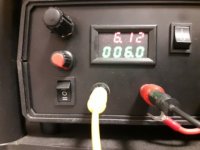Silly me.
Due to poor eyesight and difficult to read IC labels I plugged some OP275 (dual op-amps) into a +/-20V circuit that should have used OP27 (single op-amps).
The OP275s did run a little bit warm but not excessively so.
Have I destroyed them ?
Due to poor eyesight and difficult to read IC labels I plugged some OP275 (dual op-amps) into a +/-20V circuit that should have used OP27 (single op-amps).
The OP275s did run a little bit warm but not excessively so.
Have I destroyed them ?
Compare the pinouts and judge by yourself, I'd say. If Vcc and Vee are allocated to the same pins in both, you've got some chance that the device survived.
Best regards!
Best regards!
I think there's a chance they survived. Pin4 is -ve rail for both, pin7 is an output for the OP275 so the +ve supply rail will have gotten fed through a parasitic diode. It will all depend on how much current flowed as there's no intrinsic protection against outputs being shorted to rails.
A basic check would be to wire the - input pin to the output and the + input to 0V. Then see if the output is also at 0V.
A basic check would be to wire the - input pin to the output and the + input to 0V. Then see if the output is also at 0V.
Last edited:
I was measuring the current draw on the boards at the time, they were only drawing 100mA with the wrong ICs fitted.
The devices may have survived and appear operationally OK (just build a simple gain stage and check basics like current draw and offset voltage) but may have suffered impairment in other ways, some of which may be measurable if you delve deep enough. In other words they may now not meet all their finer detailed specs and may also suffer from for example a higher noise figure. Long term reliability may or may not be altered.
I would put it down to experience, mark these two up as 'suspect' and only for use in prototyping and get some replacements.
I would put it down to experience, mark these two up as 'suspect' and only for use in prototyping and get some replacements.
Better discard “suspect” parts as one will forget and the label will be gone.
You made a mistake, no problem as OP275 is sonically not top rank anyway. Throw them in the bin and no second thought and no second mistake possible (which is using them).
You made a mistake, no problem as OP275 is sonically not top rank anyway. Throw them in the bin and no second thought and no second mistake possible (which is using them).
Last edited:
As I am cleaning out my stash of audio opamps your loss maybe will hurt less. Need to make a list next weekend. All new/unused/ESD safe packed. I am sure there were new OPA637 and OPA627.
Last edited:
They can’t be cheaper than me 😀
BTW it are the dual opamps that are damaged/suspect.
BTW it are the dual opamps that are damaged/suspect.
Last edited:
When powering up something with opamps I use bench power supply with miliamperes resolution LED ammeter (with 0.1 mA resolution) and with additional mode when 1k ballast resistor is put along with a power line to limit the current to several mA (to 5-10 mA max). So I can accurately measure current which a circuit consumes and accordingly know if everything is ok.
It is 6.12V, 6.0 mA and switch in mode-II (with 1k series resistor) onto the photo (a load is 1k resistor too):
It is 6.12V, 6.0 mA and switch in mode-II (with 1k series resistor) onto the photo (a load is 1k resistor too):
Attachments
Last edited:
One of the consequences of abusing opamp input stages is reverse-biasing base-emitter junctions into reverse-breakdown, which can reduce performance (usually measurable increase in noise, loss of gain).
Such is quite hard to check for without the right test-equipment or suitable test amp circuit.
Such is quite hard to check for without the right test-equipment or suitable test amp circuit.
- Home
- Design & Build
- Parts
- Have I destroyed some expensive op-amps ?
